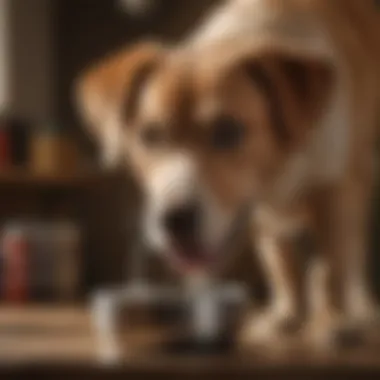Effective Strategies for Treating Dog Diarrhea


Intro
Diarrhea in dogs is a common issue that many pet owners face. It can be alarming and often demands immediate attention. Understanding the causes, symptoms, and treatment options is crucial for any responsible pet owner. In this article, we will explore how to deal with diarrhea in dogs and provide effective solutions.
Understanding Your Pet
When treating diarrhea in dogs, it's important to consider the unique characteristics of your pet. Each breed may exhibit different traits, temperaments, and needs that can influence their health and response to treatment.
Breed Traits
Some breeds are more susceptible to gastrointestinal issues than others. For instance, small breeds such as Chihuahuas or Dachshunds can have sensitive digestive systems. In contrast, larger breeds like Labradors or Great Danes might handle dietary changes better. By understanding these traits, you can tailor your approach to treating diarrhea effectively.
Common Temperaments
A dog's temperament largely affects their behavior when unwell. Some dogs may become anxious or withdrawn, while others might remain active despite their discomfort. Recognizing these behaviors can help you gauge the severity of their condition and respond accordingly.
Special Needs
Certain dogs may have specific dietary or medical needs that require careful consideration during treatment. For example, dogs with pancreatitis need a low-fat diet, while those with food allergies must avoid certain ingredients. If your dog falls into this category, consulting with a veterinarian is vital before making changes to their routine.
Pet Care Essentials
Addressing diarrhea in dogs involves a comprehensive understanding of their overall care. This section will highlight crucial aspects of dog nutrition, grooming, and health maintenance.
Nutrition and Feeding Guidelines
Proper nutrition plays a vital role in your dog's recovery from diarrhea. Here are some guidelines to follow:
- Introduce a bland diet: Consider offering plain boiled rice mixed with boiled chicken or cottage cheese. This can provide essential nutrients while being gentle on the stomach.
- Avoid fatty and rich foods: These can exacerbate diarrhea and lead to further complications.
- Provide fresh water constantly: Hydration is essential, as diarrhea can lead to significant fluid loss.
Grooming Tips and Techniques
When a dog has diarrhea, maintaining cleanliness is critical. Regular grooming can help keep your pet's coat and skin healthy. Use gentle wipes to clean up any mess, and ensure to wash their bedding frequently. This attention to hygiene can prevent skin irritations and infections.
Health and Wellness
In addition to diet, monitoring your dog's health is essential. Regular veterinary check-ups can catch underlying issues early. Be observant of any additional symptoms like vomiting or lethargy. This information can be vital for your veterinarian in assessing your pet's condition.
When to Seek Veterinary Care
If diarrhea persists for more than 24 hours or is accompanied by other concerning symptoms, it is wise to seek professional help. Some signs that warrant veterinary attention include:
- Blood in the stool
- Severe or extended vomiting
- Signs of dehydration such as dry gums or excessive thirst
- Lethargy or loss of appetite
It is better to err on the side of caution when your pet's health is at stake.
Synthesizing Key Information
Managing a dog's diarrhea can initially seem daunting, but a structured approach can simplify the process. After recognizing the signs and understanding the potential causes, you can take necessary steps for treatment, including dietary modifications and hydration. Always prioritize your dog's well-being and consult with a professional when in doubt. This proactive stance can make a significant difference in your pet’s recovery and overall health.
Understanding Diarrhea in Dogs
Understanding diarrhea in dogs is crucial for any pet owner. Diarrhea can signify various underlying issues, ranging from dietary mistakes to serious health concerns. Recognizing the symptoms and types can aid in quick identification and treatment. This knowledge is not just beneficial; it is essential in maintaining your dog's health and well-being. An informed owner can intervene early, potentially preventing more severe conditions.
Definition of Diarrhea
Diarrhea is defined as an increase in the frequency of bowel movements, often accompanied by a change in stool consistency. This means that the dog may pass stool more than usual, and it may appear softer or more liquid than normal. While occasional diarrhea might not be alarming, persistent diarrhea can lead to dehydration and other complications. Consequently, knowing what diarrhea is and understanding its significance will guide owners toward appropriate actions.
Common Symptoms to Watch For
Recognizing the common symptoms of diarrhea is important for early intervention. Symptoms include:
- Frequent bowel movements
- Watery or liquid feces
- Abdominal discomfort or bloating
- Loss of appetite
- Lethargy
If these symptoms are observed, monitoring should begin to assess if professional veterinary care is necessary.


Types of Diarrhea
Diarrhea is not uniform. There are several types, each carrying its own implications for treatment and care. Understanding the different types can help pinpoint potential causes and guide appropriate responses.
Acute Diarrhea
Acute diarrhea develops suddenly and typically lasts for a short duration. It can arise from sudden changes in diet, ingesting spoiled food, or other minor irritants. The key characteristic of acute diarrhea is its short-term nature. Understanding this type is beneficial in recognizing that a quick response might resolve the issue without needing veterinary intervention. However, if the diarrhea persists, it may indicate a more serious underlying problem requiring further attention.
Chronic Diarrhea
Chronic diarrhea is defined as diarrhea that lasts for an extended period, often more than a few days. This condition could suggest a more serious underlying health issue, such as inflammatory bowel disease or parasites. The important feature of chronic diarrhea is its persistent nature and the need for thorough investigation. Recognizing this allows pet owners to act sooner, potentially leading to better outcomes and a more effective treatment strategy.
Watery Diarrhea
Watery diarrhea involves the passage of excessively liquid stool, which can indicate significant fluid loss. It often raises concern due to the potential for dehydration. The key characteristic is the liquid consistency, which underscores the need for immediate hydration measures. Owners should understand that while it may be a common occurrence, it can escalate quickly if not monitored closely.
Bloody Diarrhea
Bloody diarrhea is one of the most alarming types and can stem from severe health issues such as infections or internal bleeding. The presence of blood can indicate serious risk factors and signals an urgent need for veterinary care. The primary feature of bloody diarrhea is its staining of the feces, which is a clear warning signal. It is crucial to take this type seriously, as it often demands quick intervention to address the underlying cause effectively.
By understanding these types and their characteristics, dog owners can make informed decisions and manage their pets’ health more effectively.
Identifying Potential Causes
Understanding the potential causes of diarrhea in dogs is a crucial step in effectively managing this condition. Diarrhea can arise from various sources, and identifying these causes can lead to more targeted treatments. This section explores several factors that could result in your dog's diarrhea. Recognizing these elements allows pet owners to take immediate precautions and understand when professional help is necessary.
Dietary Indiscretion
Dietary indiscretion refers to the consumption of inappropriate foods or substances. Dogs are known to eat anything they find, from spoiled food to human snacks that are not suitable for their digestive systems. This reckless behavior can lead to gastrointestinal upset, manifesting as diarrhea. It's important for owners to supervise their pets closely and avoid giving them table scraps or food not specifically meant for dogs. A sudden change in diet can also contribute to digestive issues. If you introduce a new food, do it gradually to prevent digestive disturbances.
Infections and Parasitic Invasion
Infections caused by bacteria or viruses can severely impact a dog's gastrointestinal health. Common infectious agents include parvovirus and salmonella. These pathogens can cause symptoms ranging from mild diarrhea to severe illness. Additionally, parasites such as giardia and whipworms can disrupt the normal function of the digestive tract. Regular veterinary check-ups and stool tests can help detect these infections early. Owners should be vigilant about their dog's health and hygiene, especially in environments with other animals.
Exposure to Toxins
Dogs may also experience diarrhea due to exposure to various toxins. This exposure can occur through ingesting household chemicals, plants that are toxic to pets, or contaminated food and water. Symptoms of toxin exposure are often accompanied by vomiting, lethargy, or changes in behavior. It is essential to keep hazardous substances out of reach and educate oneself about pet-safe plants and foods. If you suspect that your dog has ingested something toxic, contact your veterinarian immediately for advice and potential treatment options.
Underlying Health Conditions
Sometimes, diarrhea may be an indicator of underlying health issues. Conditions such as inflammatory bowel disease, pancreatitis, and liver disease can influence the dog's ability to digest food properly. Regular veterinary visits are essential to monitor your dog's health and catch any potential issues early. If diarrhea persists despite changing the diet or environment, further examination by a vet is warranted. Recognizing subtle changes in your dog's behavior or weight can provide vital clues to underlying conditions.
Understanding the cause of diarrhea in dogs is essential. Not only does it help in immediate management, but it also promotes better overall health awareness among pet owners.
Initial Steps for Treatment
Managing a dog's diarrhea involves critical first steps. These steps help in assessing the situation and determine how best to respond. Understanding these initial actions can guide pet owners through a potentially stressful time.
Assessing the Severity of Diarrhea
Start by examining the dog’s condition. Look for signs that indicate how serious the diarrhea might be. If the diarrhea is acute and persists for more than a day, or if the dog displays other concerning symptoms, it may be time to seek professional help. A dog's age, pre-existing medical conditions, and overall health should also play a role in this assessment.
Common indicators of severity include:
- Frequency of bowel movements
- Consistency of stool
- Presence of blood or mucus
- Accompanying signs like vomiting and lethargy
Tracking these symptoms can aid in determining the appropriate response. Observations should be documented as this information can be useful during a vet visit.
Monitoring Hydration Levels
Hydration is vital when a dog is experiencing diarrhea. Loss of fluids can quickly lead to dehydration, which can be critical. Monitoring water intake and skin elasticity is essential.
Signs of dehydration include:
- Dry mouth and nose
- Decreased skin elasticity
- Lethargy
Encourage your dog to drink small amounts of water frequently. If your dog refuses to drink, offering ice cubes or ice chips may help stimulate hydration. A hydration solution, from the vet or a commercial product, can also assist in replenishing lost electrolytes.


Fasting Protocol
Implementing a brief fasting protocol can be beneficial in certain cases. This allows the digestive system to rest and recover from irritation. Generally, a fast lasting 12 to 24 hours for adults dogs is often suggested. Puppies and older dogs may require shorter fasting periods due to their specific health needs. After the fasting period, it is important to reintroduce food gradually. Stick to bland and easy-to-digest options like boiled chicken and rice.
Homemade Remedies and Treatments
Homemade remedies and treatments offer a natural approach to managing your dog's diarrhea. This section focuses on how specific home-based solutions can provide comfort and promote recovery. These treatments are particularly beneficial due to their simplicity and accessibility. When considering homemade remedies, it is crucial to ensure they are safe and suitable for your dog. Always observe your dog during treatment and adjust as needed.
Bland Diet Recommendations
Boiled Chicken and Rice
Boiled chicken and rice is a classic bland diet recommended for dogs experiencing diarrhea. This dish is easy to digest and provides essential protein and carbohydrates. The key characteristic of boiled chicken and rice is its gentle nature on the stomach. It acts as a neutral base that can help firm up stools.
One unique feature of this meal is its palatability; many dogs find it appealing, especially when their appetite is reduced. However, it is important to note that this should not be a long-term diet. Relying solely on boiled chicken and rice may lead to nutritional deficiencies.
Canned Pumpkin
Canned pumpkin is another effective option for treating diarrhea in dogs. This food is high in fiber, which can aid in firming up loose stools. Its key characteristic is its natural composition, providing both nutrients and hydration.
The unique feature of canned pumpkin is its ability to support digestive health. It can soothe an upset stomach and improve overall gut function. Nonetheless, it is essential to choose pure canned pumpkin without added sugars or spices. Excessive amounts may lead to diarrhea or digestive upset.
Bone Broth
Bone broth serves as a nutritious and hydrating option during recovery from diarrhea. The key characteristic of bone broth is its rich mineral content, which supports overall health and well-being. It can be especially useful for dogs that may be refusing to eat.
One unique feature of bone broth is its liquid nature, making it easy to serve and consume. This can help maintain hydration in dogs who are reluctant to drink water. However, it is crucial to ensure that bone broth is low in sodium and free from harmful ingredients such as onions or garlic, which are toxic to dogs.
Probiotics and Digestive Aids
Probiotics are beneficial live bacteria that can improve your dog's gut health. These supplements can help restore the normal balance of gut flora, promoting healing and recovery. Some popular probiotic choices include Lactobacillus and Bifidobacterium strains. Always consult with a veterinarian prior to beginning any probiotic regimen.
Digestive aids may also include natural enzymes and fermentation products. These can help break down food more efficiently, reducing the likelihood of digestive upset. Consider adding a high-quality dog-friendly product to your dog’s diet to enhance digestive health during treatment.
Hydration Solutions
Maintaining proper hydration is crucial when a dog has diarrhea. When dogs lose fluids, they risk dehydration, which can lead to serious health issues. Providing fresh water at all times is essential. Additionally, consider using electrolyte solutions designed for pets, as these can replenish lost minerals.
You can also offer low-sodium broths or homemade soups to keep your dog hydrated and nourished. Ensuring that your dog drinks enough fluids is vital for recovery and helps in alleviating the symptoms of diarrhea.
When to Seek Veterinary Care
Understanding when to seek veterinary care for a dog suffering from diarrhea is crucial. Timely intervention can prevent complications and ensure the well-being of the animal. Not all cases of diarrhea warrant a veterinary visit, but certain signs significantly increase the urgency of professional help. Recognizing these signs enables pet owners to take prompt action, which can be life-saving.
Signs of Severe Dehydration
Severe dehydration is a critical condition that can result from diarrhea. Dogs can lose fluids and electrolytes quickly, making this a major concern. Key indicators of severe dehydration include:
- Dry gums: Healthy gums should be moist. Dryness indicates a reduction in hydration.
- Loss of skin elasticity: Pinching the skin on the back of the neck should cause it to spring back quickly if properly hydrated. Slow return can suggest dehydration.
- Sunken eyes: This is a clear sign of fluid loss. Eyes should be bright and alert, not sunken.
If these symptoms present themselves, it is imperative to consult a veterinarian immediately.
Presence of Blood in Stool
The presence of blood in a dog’s stool is alarming and often indicative of a serious underlying issue. Blood may appear as bright red streaks or it may turn the stool dark and tarry. Conditions that could cause this symptom include:
- Parasitic infections
- Gastrointestinal ulcers
- Intestinal blockages
Immediate veterinary consultation is essential here. Identifying the root cause of the bleeding can help prevent more severe health complications.
Accompanying Symptoms of Illness
Vomiting
Vomiting combined with diarrhea raises serious concerns. It can lead to rapid fluid loss, intensifying dehydration. This symptom indicates that the dog’s system is struggling to maintain balance. If your dog is vomiting alongside diarrhea, urgent evaluation by a veterinarian is often necessary. Alongside dehydration, prolonged vomiting can lead to electrolyte imbalance, posing a risk to the dog’s health.


Lethargy
Lethargy is another noteworthy symptom. If a dog exhibits a lack of energy, it may be showing signs of illness beyond just digestive upset. Key characteristics include decreased interest in play or normal activities. Lethargy can indicate pain, infection, or severe dehydration. Given this, prompt veterinary assessment is important, as it might point to a more serious condition.
Loss of Appetite
Loss of appetite is significant in the context of diarrhea. A healthy dog typically shows interest in food, but diarrhea can cause abdominal discomfort or a general feeling of malaise. When a dog refuses food for more than a day, it often signals a need for medical attention. This can help prevent deteriorating health, especially if the cause of diarrhea is unknown.
Always monitor your dog's behavior and condition closely. If there are any doubts or if symptoms worsen, consult a veterinarian without delay.
Preventing Future Episodes of Diarrhea
Preventing future episodes of diarrhea is crucial for maintaining the overall health and well-being of your dog. Not only does it help to minimize the discomfort and stress that diarrhea can cause, but it also reduces the risk of more severe health issues. A proactive approach ensures that your canine companion remains healthy and engaged in their daily life. Here, we will discuss several key strategies to prevent diarrhea in dogs, focusing on diet, veterinary care, and safe practices in their environment.
Maintaining a Balanced Diet
A balanced diet is essential for a dog's digestive health. Providing high-quality, nutritionally complete food can prevent gastrointestinal upset. You should choose dog food that is appropriate for your pet's age, size, and activity level. Pay attention to the ingredients; avoid foods with artificial additives and fillers.
Regularly introduce new foods gradually to allow your dog's digestive system to adjust. Also, avoid feeding table scraps or human food that could upset their stomach. Encourage the consumption of a variety of proteins, grains, and vegetables suitable for dogs to support overall health. Beneficial ingredients often include probiotics, which promote gut health.
Regular Vet Check-ups
Routine veterinary check-ups play an important role in preventing diarrhea. Regular visits allow for early detection of health issues that could lead to digestive problems. The vet can monitor your dog's health, change diets if necessary, and offer vaccinations against common infections that could affect the gastrointestinal tract. Professional advice on parasite control is also vital, as worms or other parasites can easily lead to diarrhea.
Your vet can recommend specific preventive measures based on your dog’s breed, age, and health history. This tailored approach ensures you are doing everything you can to maintain your pet's health.
Safe Environmental Practices
Creating a safe environment for your dog is another preventive measure against diarrhea. Regularly inspect their surroundings to eliminate access to potentially harmful substances such as household chemicals, plants toxic to dogs, or spoiled food.
Encouraging good habits such as keeping trash secured and monitoring what your dog is eating during walks is essential. Additionally, maintaining a clean living space can reduce the risk of exposing your dog to potential pathogens. Keeping your dog's dishes clean and ensuring fresh water availability also supports their health.
Understanding Breed-Specific Considerations
Understanding breed-specific considerations is essential when addressing your dog's diarrhea. Various dog breeds exhibit unique traits and susceptibilities that can influence their digestive health. Factors such as size, genetic predispositions, and even temperamental differences play significant roles. Acknowledging these nuances can help owners tailor treatment approaches, enhancing recovery and overall well-being.
Common Breed Concerns
Some breeds may be more prone to digestive issues than others. For instance, French Bulldogs are known for their sensitive stomachs, making them susceptible to diarrhea caused by dietary changes or stress. German Shepherds often face gastrointestinal disorders, which can lead to acute diarrhea. Small breeds like Chihuahuas may struggle with rapid food transitions.
Awareness of these concerns allows pet owners to be proactive. For example, if you own a breed known for sensitivity, paying closer attention to their food, treats, and changes in routine can prevent potential digestive disturbances.
Dietary Needs by Breed
Dietary needs can vary widely among breeds. Large breeds such as Great Danes require food formulated for their size, which helps avoid bloating that can lead to diarrhea. Conversely, Toy Poodles benefit from nutrient-dense diets tailored to their smaller size, ensuring they receive sufficient vitamins and minerals without overfeeding.
It's important to identify the appropriate diet for each breed. Factors to consider include:
- Life stage: Puppies require different nutrients than adults or seniors.
- Activity level: Active breeds need more calories compared to less active ones.
- Health status: Breeds prone to allergies or sensitivities must often avoid specific ingredients.
Incorporating the right diet can significantly aid in managing or preventing diarrhea for your dog. Always consult with a veterinarian to develop a tailored nutrition plan that aligns with your dog's needs.
Enrichment Activities During Recovery
During the recovery from diarrhea, enrichment activities play a vital role in ensuring the overall well-being of the dog. Engaging a pet in stimulating activities not only distracts them from discomfort but also aids in a quicker recovery process. While ensuring adequate rest and hydration is crucial, it is equally important to incorporate gentle yet stimulating experiences that can support both mental and physical health.
Gentle Exercise Recommendations
Physical activity is essential to a dog's routine. However, after experiencing diarrhea, the approach to exercise must be modified. Gentle exercise options contribute to muscle retention and mental reinforcement.
- Leashed Walks: A calm, short walk on a leash can be beneficial. Keeping the dog to a slow pace helps prevent stress on the digestive system.
- Playtime in a Controlled Environment: Engaging the dog in low-energy play can be helpful too. Tossing a soft toy or some light tug-of-war can stimulate their interest without overstimulating their body.
- Short Outdoor Visits: Fresh air is beneficial. Allowing the dog to sniff around the yard while closely supervised can uplift their spirits without exhausting them.
While these activities are helpful, the emphasis should always be on listening to the dog. If they show signs of fatigue or discomfort, it's wise to stop immediately and allow them to rest.
Mental Stimulation Techniques
Cognitive enrichment is also key during the recovery phase. Though physical activity is important, mental exercises keep the mind engaged and can be just as tiring as physical efforts.
- Puzzle Feeders: Feeding meals through puzzle toys can stimulate problem-solving skills. This should be done after the dog’s recovery begins to prevent any additional digestive stress.
- Training Sessions: Short, positive reinforcement training can engage the dog’s brain. Teaching simple commands or tricks can strengthen the bond between dog and owner and elevate mood.
- Scent Games: Hiding treats around the house or in the garden can prompt natural hunting instincts. This activity can be particularly enjoyable for dogs as they use their sense of smell to find food.
It is crucial to maintain a balance between gentle physical activity and mental challenges. Both aspects contribute significantly to recovery and overall happiness.
Engaging dogs in these types of activities during recovery from diarrhea allows them to stay occupied and stimulated. This not only diverts their attention from the discomfort associated with diarrhea but also fosters a sense of normalcy. Overall, the aim is to create a supportive recovery environment that addresses both physical and mental needs.



